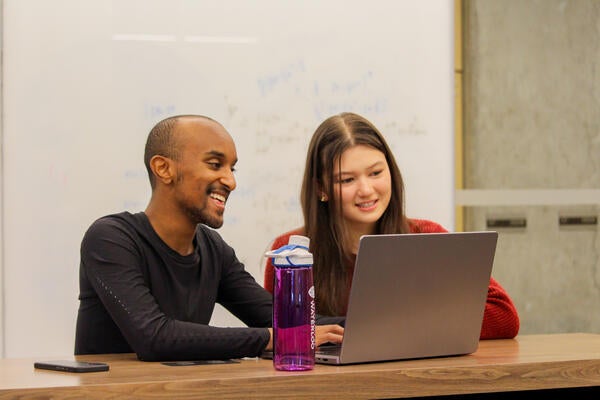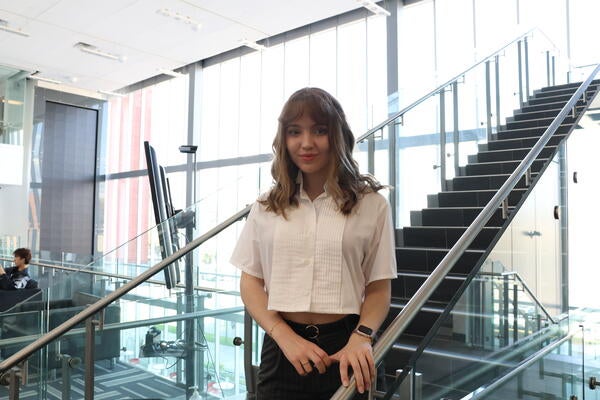
Co-op student ‘makes an impact’ with Deloitte Tech Exchange
Jordan Grant is the recipient of the Waterloo Engineering’s co-op student of the year 2015 award for his Deloitte Tech Exchange competition

Jordan Grant is the recipient of the Waterloo Engineering’s co-op student of the year 2015 award for his Deloitte Tech Exchange competition
By Julie Stauffer Faculty of EngineeringMaking photocopies wasn’t part of Jordan Grant’s job description. Neither were taking minutes, writing reports or any of the run-of-the-mill duties you’d expect to encounter in your first-year work term.
Feridun Hamdullahpur, president of the University of Waterloo, and Jordan Grant, recipient of Waterloo Engineering’s co-op student of the year 2015 award for his Deloitte Tech Exchange competition.
Instead, when the management engineering student from the University of Waterloo showed up at Deloitte Canada’s Innovation Office, his supervisors set a challenge for Grant and his fellow co-op student.
“They said, ‘we want you guys to build something,’” he recalls. “‘You’re the best and the brightest, so we want to see what you guys can do.’”
Grant got to work.
He quickly spotted an opportunity in the castoffs from the Deloitte Greenhouse. The Greenhouse — a program that helps the firm’s clients solve business challenges — had a number of high-tech gadgets that were being phased out. Grant knew how much engineering students would love a chance to play with the technology.
That was the beginning of the Deloitte Tech Exchange, or known as DTEX – a competition that would let Waterloo students tackle real-world problems using gesture-control armbands, motion sensors and augmented reality glasses.
In the fall of 2015, 70 competitors signed up, ranging from first-year to master’s-level engineering students. Divided into teams, they spent the next eight weeks using the gadgets to design creative solutions to industry challenges.
For one team, that meant designing a sophisticated motion-control system that tracks hand movements to pilot quad copters, underwater drones or robotic arms. Another used the gesture controls of a Myo armband to produce on-screen artwork.
Waterloo’s demanding workload meant not every team managed to finish, but the Deloitte Tech Exchange created plenty of benefits for everyone involved. Participants developed new skills and enhanced their CVs. Deloitte, meanwhile, raised its recruiting profile on campus, built relationships with technology companies and boosted its reputation for innovation.
As for Grant, the experience taught him how to be assertive, communicate professionally and coordinate with multiple stakeholders – not too bad for his first-ever work term.
That kind of hands-on learning is one of the factors that drew Grant to Waterloo, along with plenty of alumni recommendations. It has since more than met his expectations.
“Waterloo is big on innovation,” Grant explains. “If you have something you want to do, you can do it. It’s just the culture of the school.”
Grant’s initiative earned him an award as Waterloo Engineering’s 2015 Co-op Student of the Year. And while his tenure as an innovation analyst with Deloitte may be over, he continues volunteering to make the next Deloitte Tech Exchange competition a success.
It’s all part of his overarching plan.
“My goal is simple,” Grant declares on his LinkedIn profile. “Make an impact on this world in any way that I can, and never settle until I do.”

Read more
Redefining capstone learning by bringing students, faculty and community partners together to tackle real-world challenges

Read more
Waterloo student launches Colare through co-op and entrepreneurship programs to reimagine recruitment for engineers

Read more
Fourth-year Global Business and Digital Arts student leverages artificial intelligence to fight food inflation, saving families up to $5,000 each year
The University of Waterloo acknowledges that much of our work takes place on the traditional territory of the Neutral, Anishinaabeg, and Haudenosaunee peoples. Our main campus is situated on the Haldimand Tract, the land granted to the Six Nations that includes six miles on each side of the Grand River. Our active work toward reconciliation takes place across our campuses through research, learning, teaching, and community building, and is co-ordinated within the Office of Indigenous Relations.